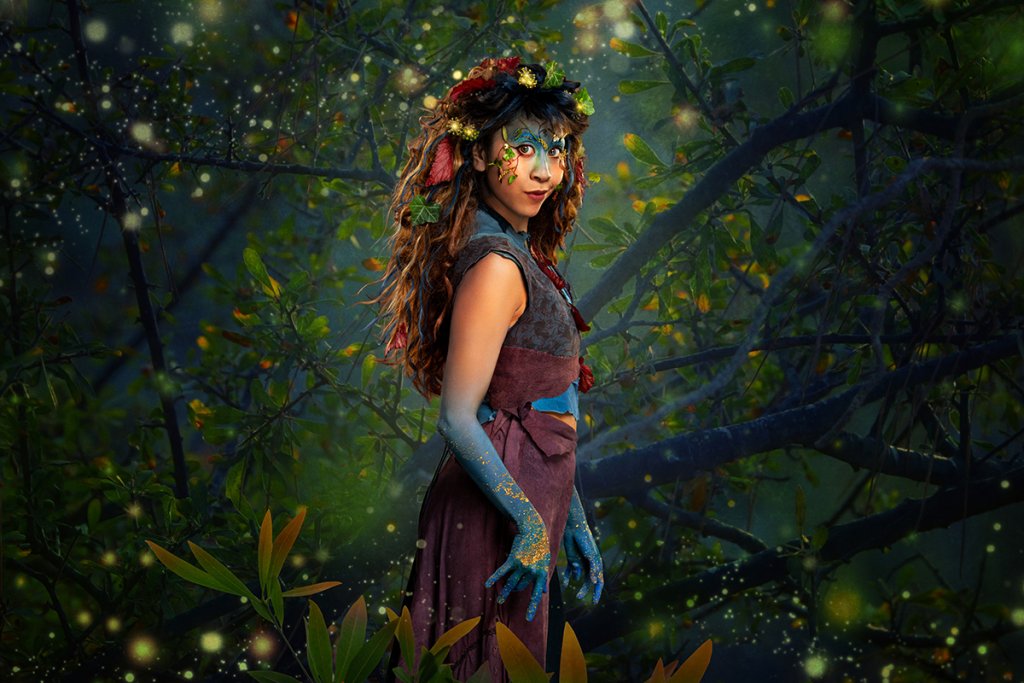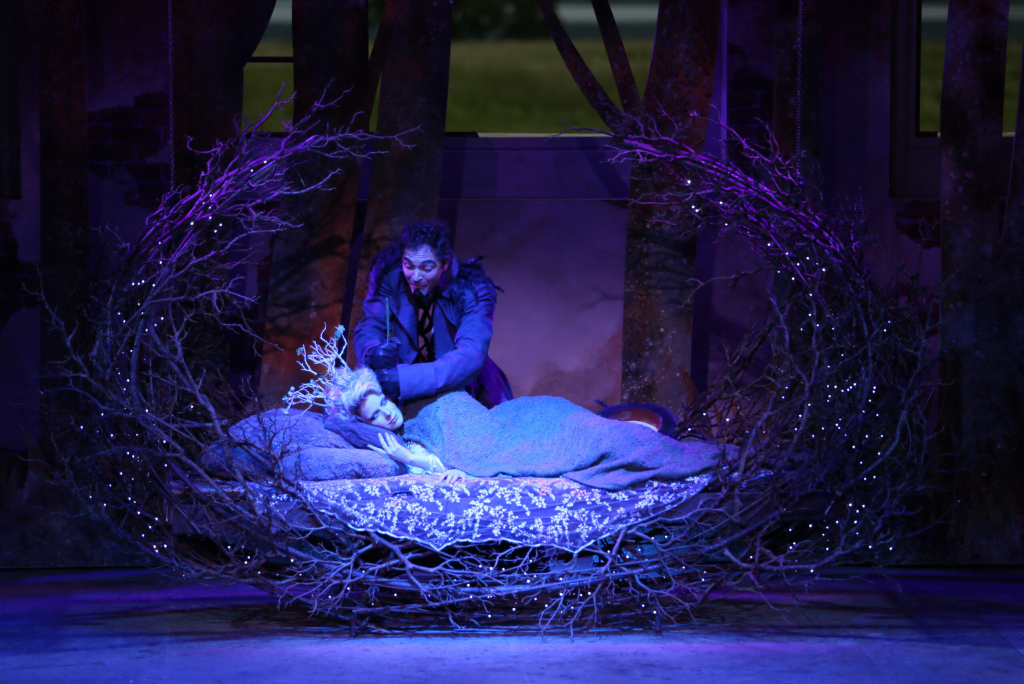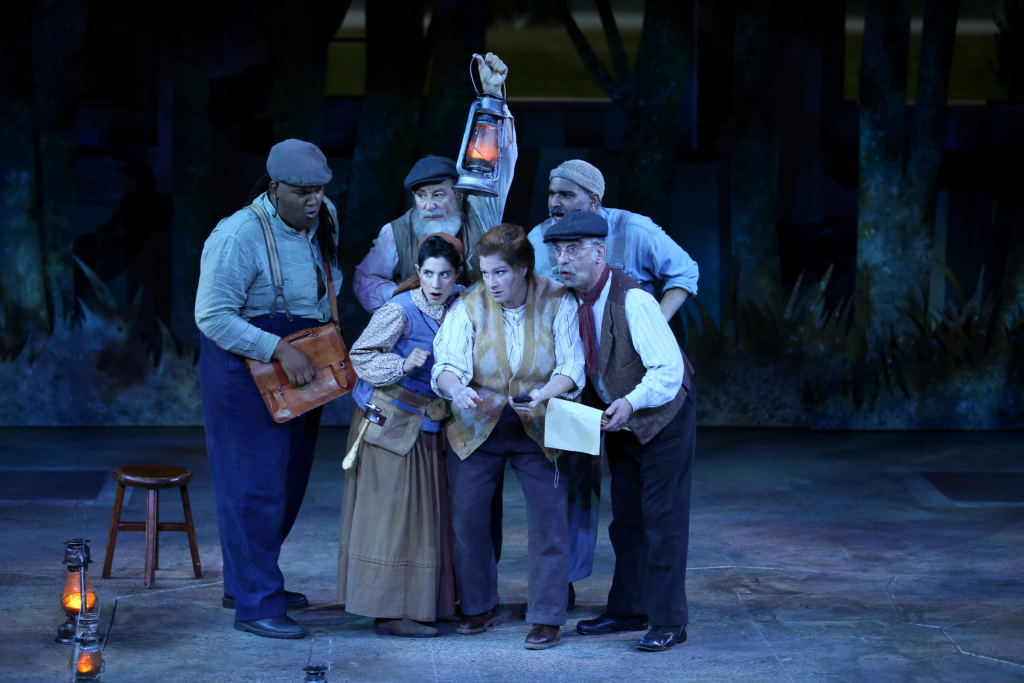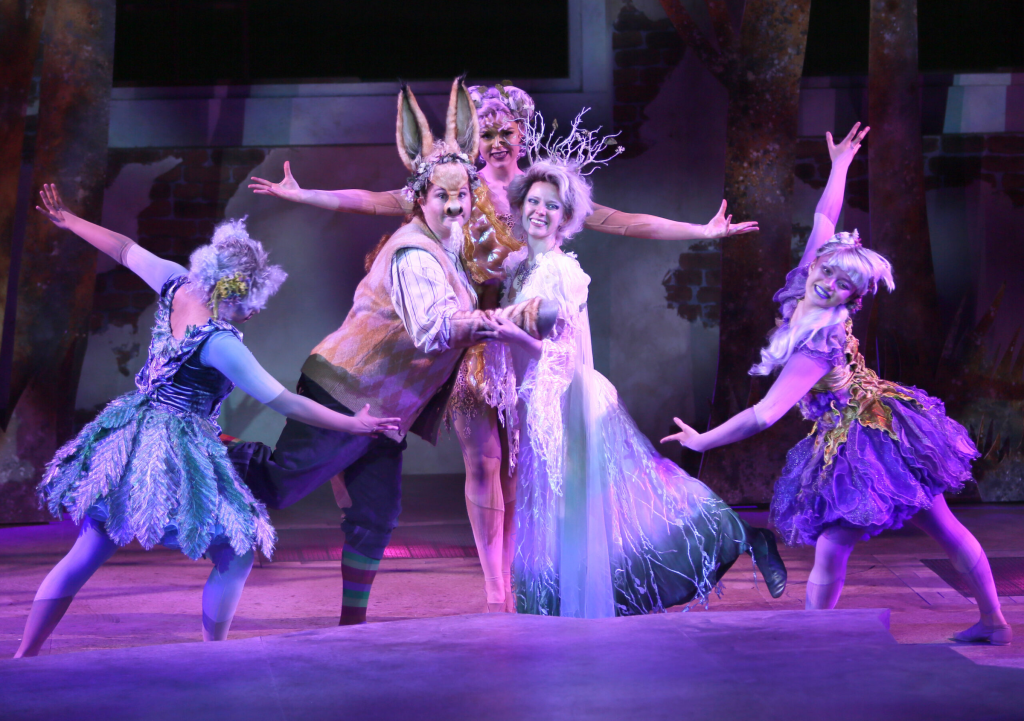
Bard on the Beach until September 24, 2022
Tickets from $27 at bardonthebeach.org or 604-739-0559
Posted July 7, 2022
This Dream is so pretty! And one costume (amongst many others) that ought to win awards for costume designer Christine Reimer, is worn by Hippolyta (Melissa Oei): an exotic ensemble heavily brocaded across the bodice and paired with a long, filmy cape emblazoned with gold leaves. And Oei, with face makeup – somewhat Maori in appearance – carries the gown, and her role, with a lot of attitude. A small-ish role made distinctive by someone who knows what’s she’s doing.
Back to pretty. There are dancing fairies in pastel tutus; Titania’s gown is a frothy confection of white lace and silk; and the set (designed by Amir Ofek and one that also serves Romeo and Juliet on the mainstage) is simple but lovely with the forest gliding in from the wings and Titania’s bower drifting down from the flies.

Credit: Tim Matheson
It’s a silly play, really, but with some serious issues that can get overlooked. In this production, directed by Scott Bellis, more is made of the politically expedient arrangement between Hippolyta and Theseus (Ashley O’Connell the night I attended) than is usual. Theirs is not a love match as Hippolyta makes abundantly clear. It may become a good marriage but it will take time, compromises and concessions – not something all the younger lovers in the play have even begun to imagine. And the same maturity can be said of the eventual match between Titania (lovely Kate Besworth) and Oberon (Billie Marchenski); there is a changeling involved and the two of them must bury their differences and work together for the infant’s benefit. There’s also the issue of Hermia’s father having the right to marry her off to whomever he pleases.
Dream shows us the stages of love, from puppy love to mature love; unexamined infatuation to carefully-considered partnering.

Credit: Tim Matheson
The plot is winding: Hermia (Heidi Damayo) loves Lysander (Olivia Hutt) who, in turn, is loved by Helena (Emily Dallas). But Hermia has been promised by her father Egeus (Joey Lespérance) to Demetrius (Christopher Allen) whom Helena disdains. Enter Puck (spritely Sarah Roa), a fairy under the command of Oberon. Through a series of errors, Puck screws it all up and all the wrong people fall in and out of love.
A note about the casting of Hutt as Lysander who, in Shakespeare’s script, is a young man. In this production, it’s just there: Lysander is a young woman. No big deal. No effort has been made to make Hutt look masculine. Hutt’s hair is long, blonde and flowing and although Lysander’s wearing trousers, the character is clearly female. It’s to director Bellis’s credit that the gender switch is made with no fanfare.
I’m not sure about Oberon’s first appearance – twelve feet tall with tree branches for arms; it’s dazzling but a bit baffling as to its intent. From that point on, however, Marchenski’s performance is cool and centred. He has a presence that simply demands our attention. There’s something je ne sais quoi about Marchenski. Never overdone. Subtle. Slightly menacing. (And wearing, it must be said, a great hat!)
A Midsummer Night’s Dream being all about love, I was a sucker for the dance – a pas de deux plus three fairies – between Marchenski’s Oberon and Besworth’s Titania. In an age where TV and film actors tear off each other’s clothes and make for the bedroom (or the kitchen table whichever comes first), it is so lovely to see a dance so romantic, so love-filled (yet still erotic) but without all the sweat. I know: I grow old, I grow old.

Credit: Tim Matheson
Not only is the road long (2 hours and 40 minutes) and winding but there’s a play within-a-play: the Tragedy of Pyramus and Thisbe, a little entertainment written by long-suffering Peter Quince (Richard Newman) for Snout (Isaac George-Hotchkiss), Starveling (Lespérance), Flute (Munish Sharma), Snug (Advah Soudack) and Bottom (Carly Street) on the occasion of Hippolyta and Theseus’s wedding.
Shakespeare never wrote a play without some crowd-pleasing dialogue and/or hijinks; Street, a very fine physical actor, takes off like a bat out of hell with the role. You will never forget her, “Hee-haw” pronounced with such weariness and, later, with a bewildered glimmer of recollection of past events. She’s the comedic heart and soul of this production right down to her smallest ear-scratching and hoof-knocking gestures.
Street’s antics alone make this Midsummer Night’s Dream a good choice for a young audience that has been well-prepared and knows the story in advance. It’s always a good idea to read the synopsis in the programme. I still do. I confess I still need to. It’s Shakespeare. It’s challenging. It’s worth it. Take a teenager and then talk about love.

